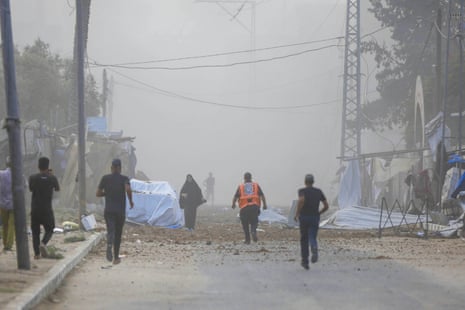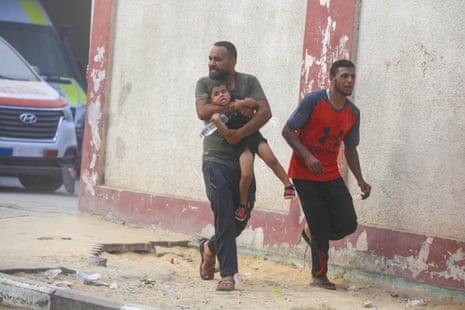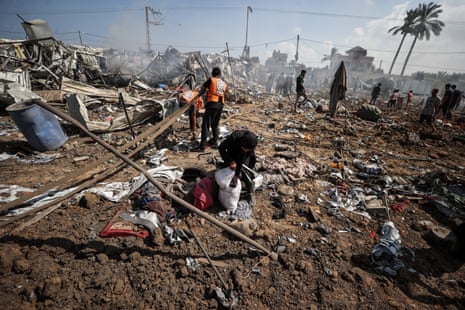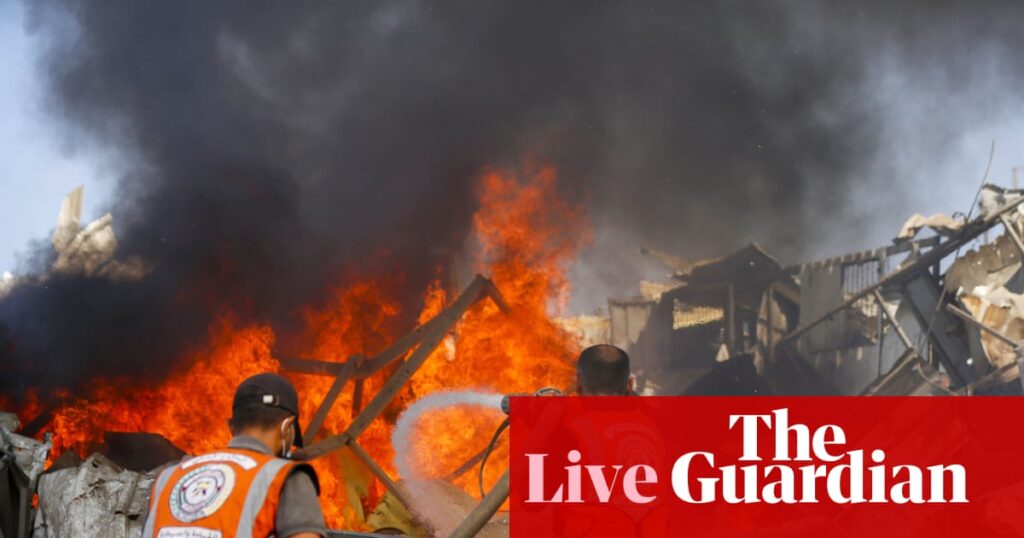NepalIsrael.com auto goggle feed
Israel keeps up military pressure on Gaza City ahead of planned offensive

Peter Beaumont
Has Israel begun its offensive to conquer Gaza City or is it hype? Following several weeks of threats of a new large-scale offensive, strongly opposed by the majority of the international community, Israeli officials have daily made announcements saying the plan to conquer Gaza City has been “approved”. It has been approved by the IDF, by the security cabinet, by defence minister Israel Katz. Later today, in an event with the Israeli military, prime minister Benjamin Netanyahu will proffer his “approval”. How many times, one is tempted to ask, does one plan need approving?
As so often in dealing with Israeli officials, and Netanyahu in particular, filtering out what is true, what is lies, and what is calculated misdirection is a complicated business.
While Reuters reported a junior defence spokesman as suggesting that the operation to take Gaza City had begun, quotes from that briefing paint a more complex picture, including a reference to the second phase of Operation Gideon’s Chariots, the Israeli military offensive that began several months ago.

In reality, however, recent military activity in Gaza was depicted as being “preliminary” to any new offensive. For his part, Netanyahu’s office put out an opaque statement saying he had asked for planning timelines for the conquest of Gaza City to be accelerated.
Given the profound divisions within Israeli society, with some 400,000 demonstrating recently in favour of a ceasefire deal and release of the remaining 20 living hostages in Gaza, and continued contacts between mediators and both Israel and Hamas, unpacking the politics of what Netanyahu is up to is complex.
On the one hand, far right members of his coalition have threatened (once again) to walk away in the event of a ceasefire, demanding the conquest of all of Gaza and Jewish settlement of the coastal strip. On the other is the fact that ceasefire talks are continuing.

Earlier this week Hamas said it had accepted a ceasefire proposal that would see the release of some 10 living hostages in the first phase of the a 60 day pause, while senior Israeli officials (but not an official “delegation”) have met with mediators even as Netanyahu has dragged his feet over giving Israel’s reply, reportedly delaying a cabinet meeting where it would have been discussed.
All of which leaves big questions unanswered . While some Israeli and international analysts have speculated that the current moves on the ground amount to pressure on Hamas to improve any deal that might just be emerging, others – like Ronen Bergman, one of Israel’s most authoritative security analysts – suggest that Netanyahu would like to push on with fighting for years if possible, in order to delay his ongoing legal cases and ensure his continued political survival.
What most agree is that any new major campaign is likely to have serious consequences. For Israelis, including senior figures in the defence establishment, one concern is whether living hostages would survive, an issue motivating the mass demonstrations.

Others point out that to all intents and purposes the deal Hamas has agreed to is one Israel signalled its agreement for only weeks ago. Any offensive would be seen by the international community for what it is, the most cynical of moves leading to an even deeper humanitarian catastrophe – if that can even be imagined.
Without much military utility, and diplomatically self harming, the suspicion then must be that much of this – for now at least – is deliberately performative, though even veteran Israeli analysts are puzzled to what end. To buy time for Netanyahu to flip flop again about what he sees as the objectives of the war? In the hope that Egyptian pressure on Hamas will provide a deal that can be sold? Or perhaps Netanyahu, like a modern day Macbeth, can no longer see a way forward or a way back, “in blood stepped in so far that should I wade no more returning were as tedious as go o’er.”
Key events
Further to comments made here, UNRWA’s commissioner-general Philippe Lazzarini has accused Israel of using “food as a weapon of war”, saying “it is a manufactured and fabricated famine.”
Relatives of Israelis held in Gaza say failure to agree ceasefire deal is a ‘death sentence’ for hostages
Relatives of Israeli hostages held in Gaza have urged Benjamin Netanyahu’s government to accept a proposed ceasefire deal saying a failure to do so is “a death sentence for the living hostages and a sentence of disappearance for the deceased ones.”
“History is repeating itself,” said Lishay Miran Lavi, wife of Omri Miran, who is thought to be alive. “There’s an agreement on the table that can save living hostages and bring deceased ones back for a proper burial. Hamas has agreed but the prime minister’s office is toiling to decree a death sentence for the living hostages and a sentence of disappearance for the deceased ones.”
Hamas agreed earlier this week to a 60-day ceasefire that would reportedly free 10 living hostages. Netanyahu has insisted on a comprehensive deal to end the war and has not convened his cabinet to discuss the 60-day truce.
Children suffering from malnutrition in Gaza could die if emergency provisions are not immediately put in place during Israel’s Gaza City military operation, the head of the UN Palestinian refugee agency has warned.
UNRWA commissioner-general Philippe Lazzarini said its data showed a six-fold increase in the number of children suffering from malnutrition in Gaza City since March.
“We have a population that is extremely weak that will be confronted with a new major military operation,” he said in comments reported by Reuters. “Many will simply not have the strength to undergo a new displacement.”
“If there is no crisis plan, then they will certainly be condemned,” he said.
Israeli citizen Saleh Abu-Hussein, who was detained in Lebanon for about a year, has returned to Israel following negotiations with the help of the Red Cross, the Israeli prime minister’s office has said.
The prime minister’s office did not disclose details on the circumstances of the citizen’s detention, according to Reuters.
Israel’s plans to expand the fighting and seize Gaza City have sparked international outcry as well as domestic opposition. The Red Cross became the latest voice to condemn the plan on Thursday, calling it “intolerable”.
The UN humanitarian agency has warned the Israeli plan to expand military operations in Gaza City would have “a horrific humanitarian impact” on the already exhausted population.
“Forcing hundreds of thousands to move south is a recipe for further disaster and could amount to forcible transfer,” OCHA said.
The UN Human Rights office in the Palestinian territories also voiced concern.
“Hundreds of families have been forced to flee, including many children, persons with disabilities, and older people, with nowhere safe to go,” it said.
Others reportedly “remain trapped, completely cut off from food, water and medicine supplies”, it added.
Israel keeps up military pressure on Gaza City ahead of planned offensive

Peter Beaumont
Has Israel begun its offensive to conquer Gaza City or is it hype? Following several weeks of threats of a new large-scale offensive, strongly opposed by the majority of the international community, Israeli officials have daily made announcements saying the plan to conquer Gaza City has been “approved”. It has been approved by the IDF, by the security cabinet, by defence minister Israel Katz. Later today, in an event with the Israeli military, prime minister Benjamin Netanyahu will proffer his “approval”. How many times, one is tempted to ask, does one plan need approving?
As so often in dealing with Israeli officials, and Netanyahu in particular, filtering out what is true, what is lies, and what is calculated misdirection is a complicated business.
While Reuters reported a junior defence spokesman as suggesting that the operation to take Gaza City had begun, quotes from that briefing paint a more complex picture, including a reference to the second phase of Operation Gideon’s Chariots, the Israeli military offensive that began several months ago.
In reality, however, recent military activity in Gaza was depicted as being “preliminary” to any new offensive. For his part, Netanyahu’s office put out an opaque statement saying he had asked for planning timelines for the conquest of Gaza City to be accelerated.
Given the profound divisions within Israeli society, with some 400,000 demonstrating recently in favour of a ceasefire deal and release of the remaining 20 living hostages in Gaza, and continued contacts between mediators and both Israel and Hamas, unpacking the politics of what Netanyahu is up to is complex.
On the one hand, far right members of his coalition have threatened (once again) to walk away in the event of a ceasefire, demanding the conquest of all of Gaza and Jewish settlement of the coastal strip. On the other is the fact that ceasefire talks are continuing.
Earlier this week Hamas said it had accepted a ceasefire proposal that would see the release of some 10 living hostages in the first phase of the a 60 day pause, while senior Israeli officials (but not an official “delegation”) have met with mediators even as Netanyahu has dragged his feet over giving Israel’s reply, reportedly delaying a cabinet meeting where it would have been discussed.
All of which leaves big questions unanswered . While some Israeli and international analysts have speculated that the current moves on the ground amount to pressure on Hamas to improve any deal that might just be emerging, others – like Ronen Bergman, one of Israel’s most authoritative security analysts – suggest that Netanyahu would like to push on with fighting for years if possible, in order to delay his ongoing legal cases and ensure his continued political survival.
What most agree is that any new major campaign is likely to have serious consequences. For Israelis, including senior figures in the defence establishment, one concern is whether living hostages would survive, an issue motivating the mass demonstrations.
Others point out that to all intents and purposes the deal Hamas has agreed to is one Israel signalled its agreement for only weeks ago. Any offensive would be seen by the international community for what it is, the most cynical of moves leading to an even deeper humanitarian catastrophe – if that can even be imagined.
Without much military utility, and diplomatically self harming, the suspicion then must be that much of this – for now at least – is deliberately performative, though even veteran Israeli analysts are puzzled to what end. To buy time for Netanyahu to flip flop again about what he sees as the objectives of the war? In the hope that Egyptian pressure on Hamas will provide a deal that can be sold? Or perhaps Netanyahu, like a modern day Macbeth, can no longer see a way forward or a way back, “in blood stepped in so far that should I wade no more returning were as tedious as go o’er.”
In Gaza City, thousands of Palestinians have left their homes as Israeli forces have escalated shelling on the Sabra and Tuffah neighbourhoods. Some families have left for shelters along the coast, while others have moved to central and southern parts of the enclave, according to residents there.
“We are facing a bitter-bitter situation, to die at home or leave and die somewhere else, as long as this war continues, survival is uncertain,” said Rabah Abu Elias, 67, a father of seven.
“In the news, they speak about a possible truce, on the ground, we only hear explosions and see deaths. To leave Gaza City or not isn’t an easy decision to make,” he told Reuters by phone.
Israeli tanks have been edging closer to densely populated Gaza City over the past ten days. Israeli officials have said evacuation notices would be issued to Palestinians there before the military moves in.
Two more people have died of starvation and malnutrition in Gaza in the past 24 hours, the territory’s health ministry said on Thursday. The new deaths raised the number of Palestinians who have died from such causes to 271, including 112 children, since the war began.
Iran was seeking to reassert an image of strength on Thursday after suffering heavy losses, when Israel largely destroyed Iran’s air defences during the war and much of its stockpile of ballistic weapons is believed to have been damaged by Israeli strikes.
The Iranian Defence Ministry said in a statement on Thursday: “Any new adventure by the enemy will be faced with a strong slap.”
Navy units of Iran’s regular armed forces fired missiles and drones at open water targets in the Indian Ocean under the “Sustainable Power 1404” drill, state television reported.
“These drills take place around a month after the Iran-Russia drill under the name Casarex 2025 which took place in Iran’s northern waters (Caspian Sea). The Sustainable Power drills…are in Iran’s southern waters,” state TV said.
Iranian state television report said the nation’s first millitary exercise since the 12-day war with Israel involved a frigate IRIS Sabalan and a smaller vessel, the IRIS Ganaveh, which launched Nasir and Qadir cruise missiles at targets in the sea, striking them. Coastal batteries also opened fire as part of the exercise.

Josh Butler
Benjamin Netanyahu has ignored pleas from Australian Jewish groups to calm his feud with Anthony Albanese, further criticising the prime minister and escalating an ugly spat between the two leaders.
Australia’s peak Jewish group, the Executive Council of Australian Jewry (ECAJ), on Wednesday labelled Israeli prime minister Netanyahu’s attack on Albanese as “inflammatory and provocative”, and a “clumsy intervention” which had affected Australia’s Jewish community.
ECAJ’s president, Daniel Aghion, wrote letters to both leaders, critical of the conduct of Albanese and Netanyahu and urging a resolution “in the usual way through diplomacy rather than public posturing”. The group’s co-executive, Alex Ryvchin, had additionally called for “both governments to remember what’s at stake to ensure that calm heads prevail and to conduct their matters of state privately, diplomatically”.
But in a new interview with Sky News, Netanyahu again labelled Albanese “weak”. Read the full story here:
Israel attacks Gaza City overnight, say residents, as defence ministry approves expanded offensive
Israel hammered Gaza City and its outskirts overnight, residents said Thursday, after the defence ministry approved an expanded offensive to target the remaining Hamas strongholds in the strip.
The newly approved plan authorises the call-up of roughly 60,000 reservists, deepening fears the campaign will worsen the already catastrophic humanitarian crisis in the Palestinian territory.
“We are not waiting. We have begun the preliminary actions, and already now, IDF (army) troops are holding the outskirts of Gaza City,” the Israeli military said in a statement.
Israel’s plans to expand the fighting and take control of Gaza City have sparked international outcry as well as domestic opposition.
Ahead of the offensive, the Israeli military said the call-up of the reservists would begin in early September.
Gaza City residents described relentless bombardments overnight.
“The house shakes with us all night long – the sound of explosions, artillery, warplanes, ambulances, and cries for help is killing us,” one of them, Ahmad al-Shanti, told AFP.
“The sound is getting closer, but where would we go?”.
Iran publicly hanged a convicted murderer at the scene of his alleged crime on Thursday, the judiciary said, just two days after another public execution.
Most executions in Iran are carried out inside prisons. Public executions are generally reserved for offences that caused particular outrage.
The latest hanging was carried out at dawn in the city of Kordkuy “at the scene of the crime and in public”, provincial judiciary chief Heidar Asiabi told the judiciary’s Mizan Online news website.
The condemned man had been convicted of killing “a couple and a young woman with a hunting rifle” late last year, Mizan reported.
Nine students in Gaza with full scholarships to study at British universities have been told the UK government is working to facilitate their evacuation.
The students – who have all been awarded Chevening scholarships, funded by the Foreign Office in recognition of their potential as future leaders – welcomed the development on Wednesday, but dozens more Palestinians in Gaza with university places are still awaiting news.
The breakthrough follows months of advocacy and campaigning by more than 100 MPs, university leaders and other civil society organisations. More than 80 Palestinian students in total have offers at UK universities, including 40 who have secured full scholarships.
Dr Nora Parr, a researcher at the University of Birmingham who has been coordinating efforts to support the students, said: “We received news of the government plans with mixed emotions. On the one hand, relief that indeed there is a shared sense of the importance and urgency of the students’ situation – and on the other our hearts sank. What about the rest? We must believe that this is only a start.”
Read the full report here:
Iran launched its first military exercise since the end of its 12-day war with Israel, state television reported on Thursday, with navy vessels launching missiles at targets at sea in the Gulf of Oman and the Indian Ocean.
While such drills are routine in the Islamic Republic, the “Sustainable Power 1404” exercise comes as authorities in Iran are trying to project strength in the wake of a war that saw Israel destroy air defence systems and bomb nuclear facilities and other sites.
The state TV report said naval vessels would fire cruise missiles at targets and use drones over the open water. It did not immediately air any footage from the exercise.
Iran’s navy, estimated to have 18,000 personnel, apparently avoided any major attack during the June war.
The navy, based out of the port city of Bandar Abbas, patrols the Gulf of Oman, the Indian Ocean and the Caspian Sea, and broadly leaves the Persian Gulf and its narrow mouth, the strait of Hormuz, to Iran’s paramilitary Revolutionary Guard.
Here are some of the latest images from Gaza:
A group of 17 US Senators sent a letter to Secretary of State Marco Rubio on Wednesday calling for the United States to press Israel to grant access and protection to journalists in Gaza.
The letter comes one week after an Israeli strike killed a group of Palestinian journalists in the besieged territory.
“The United States must make it clear to Israel that banning and censoring media organizations and targeting or threatening members of the press is unacceptable and must stop,” the Democratic senators said in a statement.
The letter to Rubio, a staunch supporter of Israel, said: “We urge you to press the Israeli government to protect journalists in Gaza and allow international media to access the territory.”
Last week, an Israeli strike killed four journalists for Al Jazeera, including Qatari television correspondent Anas al-Sharif, as well as two freelance journalists.
Israel to call up 60,000 reservists as it launches ‘first stages’ of attack on Gaza City
Welcome to our live coverage of the Israel-Gaza war and wider Middle East crisis.
The Israeli military has announced the first steps of an operation to take over Gaza City and said it was calling up an extra 60,000 reservists for the offensive.
It came as the government considered a new ceasefire proposal that Hamas has agreed on to pause the war and, separately, Israel approved a huge new illegal settlement in the West Bank.
Military spokesperson Effie Defrin said on Wednesday the Israel Defense Forces had “begun the preliminary operations and the first stages of the attack on Gaza City, and already now IDF forces are holding the outskirts of Gaza City”.
Israeli troops clashed with Hamas fighters in Gaza on Wednesday and Benjamin Netanyahu’s office said later that the prime minister had sped up the timeline for taking control of Hamas strongholds and defeating the militant group.
UN secretary general António Guterres on Thursday called for an immediate ceasefire in Gaza, saying it was necessary “to avoid the death and destruction that a military operation against Gaza City would inevitably cause”.
In other key developments:
-
Israeli defence minister Israel Katz’s order to send more troops into Gaza City came despite international criticism of the offensive, with fears of significant casualties and more mass displacement amid widening conditions of starvation in the territory.
-
The situation in Gaza City was “catastrophic” and “large numbers” were fleeing eastern neighbourhoods, according to the Gaza municipality’s emergency committee chief, Mustafa Qazzaat. Resident Anis Daloul, 64, told the AFP news agency the Israeli military had “destroyed most of the buildings in Zeitoun and displaced thousands of people”.
-
The additional Israeli reserve soldiers would not report for duty until September, a military official said on Wednesday, giving mediators time to bridge gaps between Hamas and Israel over the terms of any ceasefire and hostage deal.
-
Hamas said Israel’s plans to conquer Gaza City showed its “blatant disregard” for efforts to broker a truce. The Israeli talk of a large-scale operation could primarily be intended to put pressure on the militant group in ceasefire talks, reports Peter Beaumont.
-
More than 62,000 Palestinians have been killed in the Israeli war in Gaza since Hamas’s deadly attacks in October 2023, according to Gaza health officials.
-
British UK foreign secretary David Lammy condemned Israel’s approval of the new settlement block in the West Bank as a “flagrant breach of international law”. The plan would split the West Bank into two with the intention – Israeli far-right minister Bezalel Smotrich has said – of ending any prospect of a Palestinian state.
-
The Israeli military said on Thursday it has received a report about a security incident near the settlement of Malachei HaShalom in the West Bank, adding that details were under review.
The post”Israel keeps up military pressure on Gaza City ahead of planned offensive – Middle East crisis live | Gaza” is auto generated by Nepalisrael.com’s Auto feed for the information purpose. [/gpt3]




